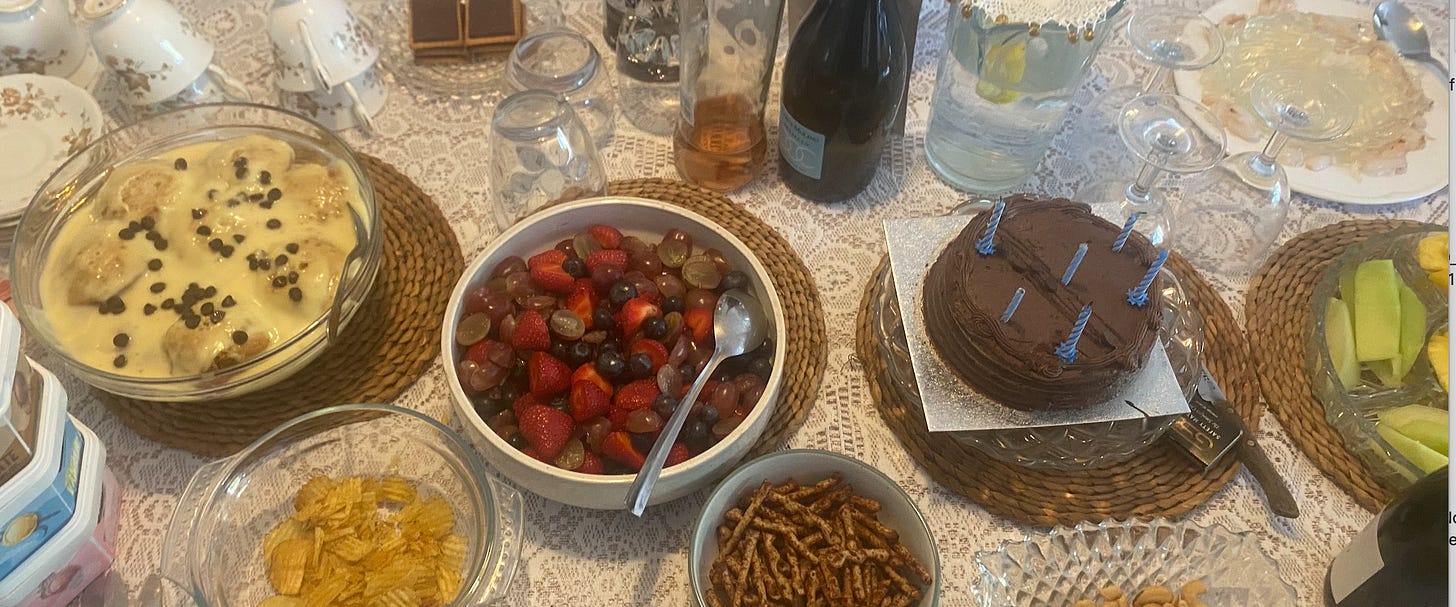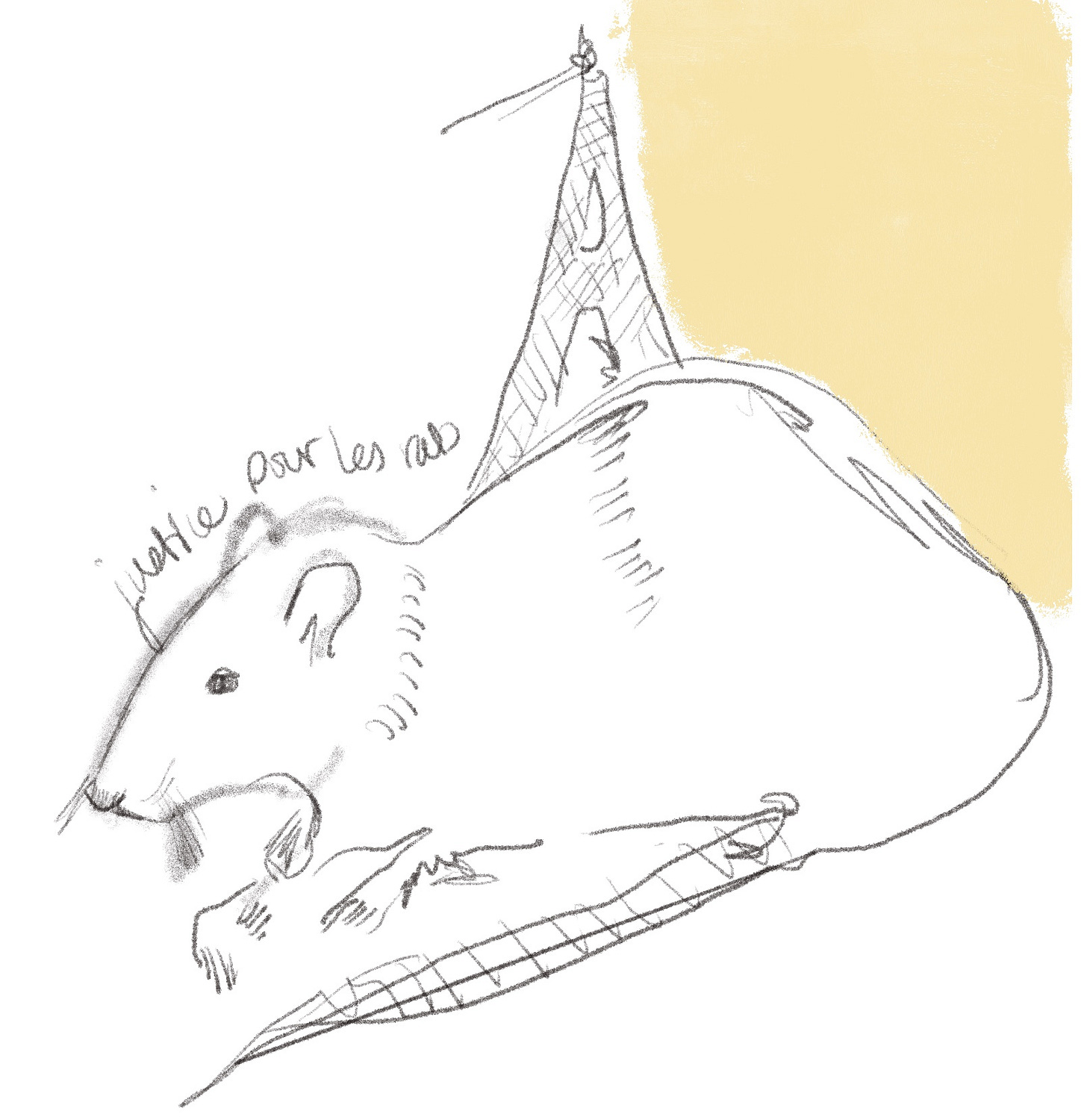Dear Friend,
I hope you are having a good mid-to-late August. Thank you for your patience with the more irregular rhythm of my letters during les vacances.
Last week I was in my hometown of Hounslow in West London, celebrating my birthday. This year, to mark reaching a nondescript age in my early thirties, I decided to indulge my inner child. I asked my mother if she would mind making me a ‘party tea’. For those unfamiliar with the concept, a party tea comprises a big spread of assorted finger-foods, as you would expect to find at a child’s party.
My mum outdid herself. In the savoury department, we had little triangular sandwiches with the crusts cut off, a number of different kinds of crisps, sausage rolls, dips, cheeses, and so on. For the sweet spread (yes, there was a dedicated sweet spread), we had an enchanting selection of desserts spanning fruit salad, lemon drizzle cake, chocolate cake and a magnificent strawberry trifle, featuring a sherry-soaked cake layer. It was all I wanted and more.
This month also marks another important anniversary: it is a year since I wrote my first Pen Friend letter! I first sent it almost as an experiment, not expecting it to be read by many people, which I think was a good thing. My superlatively accomplished writer friend
kindly recommended the letter after the first edition, and thanks to her I gained many early Friends.A year, some 45 letters and perhaps 60,000 or so words later, hundreds of Friends now receive this (usually) weekly missive and I am heartened to see that many open it every week. Some kind Friends have also decided to sponsor the letter, which I am immensely grateful for.
Quite quickly, the thinking about and writing of this letter became an important frame for my week, and though sometimes it requires discipline to sit down and send it on a Sunday, I invariably feel better, clearer and more focused for having done so. It has become as source of joy and satisfaction in my life. Without continuing too far down this self-referential road, I want to say THANK YOU for agreeing to be my Pen Friend, and I hope our correspondence will go from strength to strength this coming year!
Rats are political
Let it not be said that I don’t have range as a writer.
Hot on the heels of a recent guide I wrote to the glamorous French Riviera, editors at The Telegraph this week asked me to write a piece on an equally fascinating subject, if a rather different one: RATS! And in particular, the rats of Paris.
Now, I am no stranger to this subject. As a child, I was the proud owner of, at different times, two different fancy rats (the official name for domestic pet rats). The first, a white with a dark-brown head, was a rescue whose name, Rizla (a brand of cigarette rolling papers) had been chosen by his previous owner. My second rat, white with a grey head, was shop-bought and, thanks to his penchant for acrobatic movement, was named after one of my favourite movie stars, Jackie Chan.
Well, it turns out that rats are all the rage right now. Last week an American tourist went viral on TikTok after posting a video of central Paris where he expressed his surprise at the volume of the rat community. In the video, he describes his shock at seeing “a whole-ass family” of rats. In a puzzling move for someone so seemingly disgusted by rats, he goes on to feed the animals some tasty french fries, which is pretty much an example of best practice for encouraging rats to hang out.
Using this video as a jumping-off point, my article (which I think will be published next week) explores claims that Paris is one of the most rat-filled cities in the world, and that the problem has become worse in recent years, under the leadership of Paris’s current mayor.
Even conceding my pre-existing interest in the species, I found the research of this piece fascinating. Most especially I was struck by how political the issue of rats is, and apparently has been for many centuries.
As long as there has been a city of Paris to speak of, there have been rats. In the 1300s, the rats of Paris were blamed for spreading plague via their fleas. The rats at the time, it would seem, were not the brown rats who dominate in Paris today, but either black rats or as some scientists claim, gerbils!
More recent studies go as far as to suggest that the idea that rats spread the plague in the first place is slander, that they weren’t responsible for the spread of the plague at all. One comprehensive study from a few years ago concluded that the nature of the spread and the archeological evidence points rather to transmission through fleas and parasites carried by humans ourselves.
From my research, what seemed to emerge again and again was the idea that rats seem to act as a foil for people’s feelings about their city or their leaders at the time, or even about their own psyches. This still holds true today.
Paris’s Socialist mayor Anne Hidalgo attracts strong feelings among Parisians, in particular in reaction to her radical redesign of the city with an anti-car, pro-pedestrian and hyper-local focus. In the lead-up to the Olympic Games next year, the mayor is busy adding hundreds of kilometres of cycle track, closing many roads to cars and redeveloping parts of the Metro line. A great deal of building work has ensued and the changes have won ire from diverse opponents from the traditional right, to taxi drivers to conspiracy theorists.
Hidalgo’s opponents also believe that Paris’s rat problem has worsened on her watch. The city of Paris seems to have taken a more humane approach than, say, New York’s Mayor Eric Adams, who has this year recruited a “bloodthirsty” ‘rat czar’. Among other measures, like strategically placed traps and littering reduction campaigns, the city hall has also commissioned an in-depth study in collaboration with the prestigious Pasteur Institute. The aim is to try and actually get an idea of where the city rats live and how they behave, what real threat they present to public health (vs. what is just plague-era prejudice) and also how humans can ‘cohabiter’ with the rat population.
Her critics immediately jumped on this study and used it as proof that Hidalgo wants to invite rats to city hall to have tea parties with her and live together (or something like that). It seems to me that rats are and always have been a kind of bellwether or litmus test for the mood of a place, and an outlet for all the social ills of the time. In this way, rats are eminently political.
Next time I see a swarm of them scurrying past Notre-Dame at night, I shall look at them quite differently.
“Rats provide the historical genre the most beautiful subject in the world: they have to do with everything and everything has to do with them.” – An eighteenth century scholar quoted in the New York Review of Books by Madeleine Schwartz.
Thirty-second book club
I just finished A Big Life (in Advertising). It’s the memoir of Mary Wells Lawrence, the first female CEO of an advertising agency and the first female CEO of a company on the New York Stock Exchange. In this book, the author comes across as both relentlessly capitalistic and also life-loving, human and extremely bright.
A few months ago, a dear friend whom I know through my corporate consulting work, told me that she was re-watching Mad Men, the iconic retro series about the ‘golden’ age of American advertising in the 1960s. I was inspired to do the same, and found out soon after that the character of Peggy, the bright female copywriter in a world of male execs, was inspired by Wells Lawrence.
In the book, Mary (as I like to call her in my head) talks about the challenge of making Alka-Seltzer, a fizzing indigestion medicine, sexy. The passage is extraordinary as a quintessential illustration of, for want of a better word, capitalism.
“I thought that anybody who was anybody in the sixties would have to have indigestion or heartburn. Well, God made Alka-Seltzer so that you can survive life in the world— for the upset stomachs, the headaches, the heavy downer feelings, the indigestion and burning gut you get from anger, frustration, overwork, underappreciation and being exploited…If you don’t get heartburn you are a nobody. That became my overall thesis for Alka-Seltzer. You’re nobody if you don’t have heartburn.” - Mary Wells Lawrence, A Big Life
Et voilà ! Thank you for reading this letter about rats, prejudice, indigestion and also about this letter itself.
Do you have a friend who you think might like to also be a Pen Friend? Please do share this with them if so!
I’ll write next week for the September rentrée. Have a great week until then!
Yours,
Hannah







Now that’s a feast!
Happy newsletter birthday - and actual birthday! X